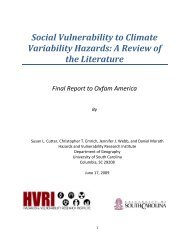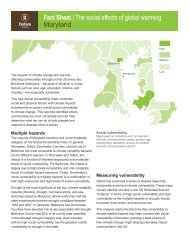Poverty Footprint Study on how the Coca Cola - Oxfam America
Poverty Footprint Study on how the Coca Cola - Oxfam America
Poverty Footprint Study on how the Coca Cola - Oxfam America
Create successful ePaper yourself
Turn your PDF publications into a flip-book with our unique Google optimized e-Paper software.
0<br />
[When] we get out at night, we are<br />
exposed to <strong>the</strong> dangers outside<br />
<strong>the</strong> facilities. It would be good if <strong>the</strong><br />
company provided transportati<strong>on</strong>.<br />
—Female employee at ILC<br />
legally permitted and widespread, affecting<br />
16 percent of married women in <strong>the</strong> country. 59<br />
Women are often dependent up<strong>on</strong> men and have<br />
limited ec<strong>on</strong>omic opportunities.<br />
In El Salvador, women’s c<strong>on</strong>diti<strong>on</strong>s are comparatively<br />
str<strong>on</strong>ger due to differing cultural norms, but <strong>the</strong>y also<br />
face serious barriers in reaching <strong>the</strong>ir full ec<strong>on</strong>omic<br />
potential and accessing educati<strong>on</strong>. Women in El<br />
Salvador have equal rights to own land by law, but<br />
traditi<strong>on</strong> often prevents women from fully exercising<br />
<strong>the</strong>ir rights. 60<br />
Women’s underrepresentati<strong>on</strong><br />
The study revealed that in both countries <strong>the</strong>re are<br />
clear barriers to women’s participati<strong>on</strong> in sugar<br />
farming and producti<strong>on</strong> due to biased land allocati<strong>on</strong>,<br />
lack of access to credit and limited educati<strong>on</strong>al<br />
opportunities.<br />
Agricultural policies, laws and practice can often<br />
disadvantage female producers. Access to land is<br />
a major problem, particularly for married women.<br />
Most do not have <strong>the</strong> capital to buy land outright,<br />
and state and traditi<strong>on</strong>al systems of land allocati<strong>on</strong><br />
favor men. Without access to—and c<strong>on</strong>trol of—land,<br />
women’s social, ec<strong>on</strong>omic and political security is<br />
compromised. Land tenure is a prerequisite when<br />
gaining access to credit and loans for agricultural<br />
essentials such as seed, fertilizer and equipment.<br />
Women are largely underrepresented in <strong>the</strong> most<br />
secure, formal jobs in many developing country<br />
ec<strong>on</strong>omies—including in <strong>the</strong> <strong>Coca</strong>-<strong>Cola</strong>/SABMiller<br />
value chain–and often overrepresented in <strong>the</strong> most<br />
vulnerable jobs. In both countries, sugarcane cutting<br />
is traditi<strong>on</strong>ally c<strong>on</strong>sidered a male role, and men earn<br />
as much as two and a half times <strong>the</strong> income earned<br />
by women. As harvesting requires significant physical<br />
strength, limited numbers of women participate in it.<br />
In Zambia, women own <strong>on</strong>ly 6 percent of small-scale<br />
sugar farms, and even in <strong>the</strong> progressive Kaleya<br />
Smallholders Company61 women c<strong>on</strong>stitute <strong>on</strong>ly<br />
23 percent of <strong>the</strong> formal membership but c<strong>on</strong>duct up<br />
to 80 percent of <strong>the</strong> farm labor.<br />
Exploring <strong>the</strong> links between internati<strong>on</strong>al business and poverty reducti<strong>on</strong> 61




